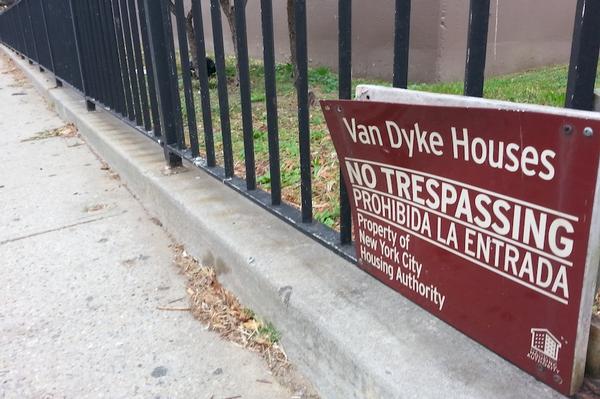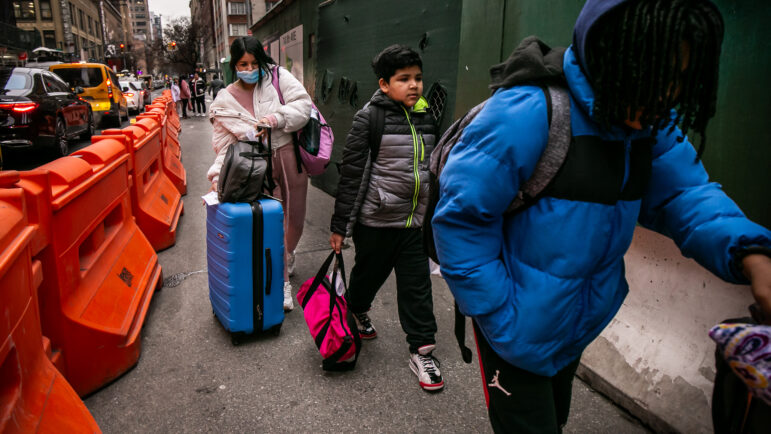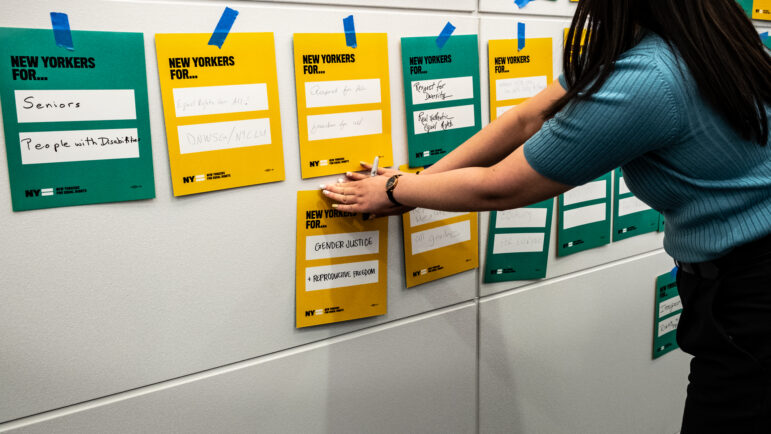
Photo by: Jarrett Murphy
Residents often complain about conditions at the Van Dyke Houses, but no one we spoke to raised that issue. In fact, many expressly said that the most important issues facing the city were not ones they confronted personally.
Not everyone who lives around Brownsville’s Van Dyke Houses is going to be glued to the screen for tonight’s first debate between Democrat Bill de Blasio and Republican Joe Lhota.
The first person we spoke to last Friday about what questions they hoped the mayoral hopefuls would answer told us he couldn’t vote because he is a Muslim and it’s against his religion.
Another man backed away, saying, “No, I’m not getting involved in none of that.” A woman pushing a baby stroller and waiting under scaffolding as a light rain fell said, “Nobody really likes to talk about Brownsville. I’ve got to get some cheese and some bread.”
But most people we interviewed did have at least one question they wanted to ask, or one topic they hoped the candidates would weigh in on.
1) How will you take guns off the street, while addressing problems with stop and frisk?
2) How will you address the desires of municipal employees for a raise?
3) How will you protect the city from terrorism?
Leaving the NYCHA building at 422 Blake Avenue, Darrel, who is 42, stopped and thought before he said he was most curious about what the candidates would say about, “How to take guns off the street.”
Walking past a few moments later, an off-duty NYPD school safety officer who refused to give her name said that she was most interested in whether she’d get a raise.
At a bus stop near Powell Street and Dumont Avenue, one elderly woman suggested that the candidates ought simply to call her.
But Bridget King was a font of queries. “How is he going to take care of the senior citizens and things like that. What’s he going to do about that stop and frisk?” she asked. “Make sure he protects the city from 9/11. Housing—the housing department is not doing the correct job.” Then King jumped on the bus.
4)Will you commit to keeping senior centers open?
5) What will be your approach to school funding?
6) What will you do for neighborhoods like Brownsville?
7) How will you make more truly affordable housing available?
Inside the Van Dyke senior center at noon, a physical trainer was leading a circle of mature clients through a set of isometric exercises.
As they pumped their fist toward the ceiling or completed biceps curls, he shouted at them, “Are we weak? Are we strong? Are we old?” to which the crowd gamely bellowed “No … Yes … No.”
Jessica Locklear says she comes to the center almost daily. It’s a vital resource, though it use to offer more: There was once a visual artist who gave lessons, but that program has come and gone. “Keeping the senior centers open is very good,” she said when asked what she’d want to say to the candidates.
Mattie, sitting next to Locklear for the lunch of baked fish and pasta, would like to know: “If they could have charities in schools. Kids don’t have enough material in school to do their work. And schools are crowded.” And sitting with her grandmother a few seats away—the youngest person in the room—Star Winston added that she’d ask, “What’s his plan to improve our schools?”
“Ask, ‘What are they going to do for Brownsville?’ Because we need help,” Jessie Dozier added. “The young people need an education. And the old people are sick. We need nurses to come to the house. And we need money for the kids so they can buy things and enjoy life, too.”
Odessia Nsafoah lives not in Van Dyke but nearby in a house built 30 years ago by the Nehemiah Project. “My main concern would be affordable housing. Manhattan is ridiculous and Brooklyn is getting there really fast,” she says. “I don’t know too many people who can afford an apartment—I mean East New York affordable, not Manhattan affordable.”
8) What will your approach to NYCHA community centers be?
9) How you will make more jobs available to young people in low-income neighborhoods?
Friday was the final day to register to vote in the general election. It was not clear how many of Van Dyke’s voters will turn out on November 5. The election district that covers the southeast corner of the sprawling, 22-acre development—the 65th—went strongly for de Blasio on September 10. But the low wattage nature of the mayor’s race so far may keep some locals at home.
What’s more, the Board of Election has moved the polling location for the 65th from the senior center on Dumont Street, where it has been for sometime and was on primary and runoff day this year, to a school three blocks north.
Lisa Kenner, a former Democratic district leader who still wields influence as the president of Van Dyke’s resident association, is concerned that the move will depress turnout. It’s not really a long way to walk for the privilege of voting, she says—but it will be enough to confuse and dissuade some voters.
She says she’d ask the candidates: “Why are you allowing NYCHA to give up its community centers to DYCD?” referring to a plan to shift control of the local center to the Department of Youth and Community Development, a step Kenner worries will weaken the connection between the center and the Van Dyke development.
“And how are you going to help Brownsville’s young people get a job?” Kenner added.
But the big question she has is why the polling place has moved. That’s a query she plans to direct to the Board of Elections.








